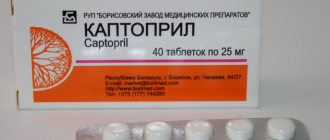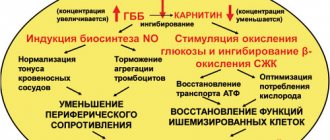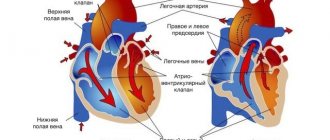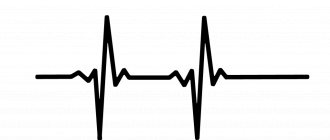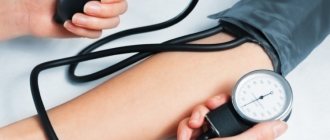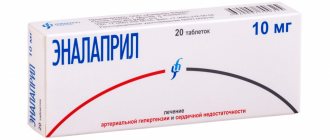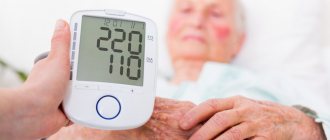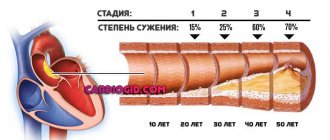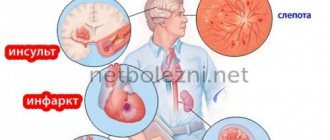Buying good medicine for high blood pressure is not easy. A pharmacist at a pharmacy will rarely help; he will immediately send you to a doctor. Is it really so difficult to recommend a reliable drug at an affordable price? Let's try to understand the types of drugs and the principles of taking them.
Get all the necessary tests at a discount of 10% to 25% using the promotional code “MOESHEALTH”. Visit one of the many conveniently located KDL medical offices https://bit.ly/3gIM9wP or call a nurse for free to collect biomaterial using the innovative laboratory service LifeTime https://bit.ly/3yd9Pj2
Types of hypertension
The terms “hypertension” and “hypertension” can be considered identical.
The difference between them is that hypertension is a diagnosis (disease), and hypertension is the very fact of high blood pressure (more than 140/90 mm Hg). Hypertension is said to occur when high blood pressure is not an occasional phenomenon, but bothers a person regularly. There are several classifications of hypertension. Based on their origin, there are 2 main types - primary and secondary hypertension.
Primary hypertension
It is also called essential or idiopathic (of unclear origin). According to statistics, up to 90% of people with high blood pressure have essential hypertension. Medicine is not able to determine the true causes of such hypertension, so patients are offered symptomatic treatment - constantly measure blood pressure and take medications to reduce it (if necessary).
Risk factors for primary hypertension include:
- Hereditary predisposition - the presence among direct relatives of hypertension and people suffering from cardiovascular diseases. Currently, more than 50 genes are known that may be associated with high blood pressure³.
- Smoking. In smokers, blood vessels constantly spasm (narrow). This increases the risk of developing cardiovascular diseases, including hypertension.
- Age and gender. The likelihood of developing essential hypertension increases with age. The majority of patients with arterial hypertension are people over 55 years of age. Men are more likely to worry about high blood pressure than women.
- Obesity. This is one of the significant factors in the development of hypertension. It has been found that obese people are 5 times more likely to develop hypertension than people of normal weight. Epidemiological studies show that more than 60% of people with hypertension are also overweight⁴. And 85% of hypertensive patients have a body mass index above 25⁴.
What is body mass index
Body mass index (BMI) is a value that allows you to estimate the ratio of a person’s weight to his height. Calculating BMI is very simple. To do this, you need to divide your body weight in kg by the square of your height in meters (I=m/h²). For example, if your height is 1 meter and 82 cm, and your weight is 82 kg, then BMI = 82/1.82² = 24.76. A BMI of 18.5 to 25 is considered normal. From 25 to 30 is overweight (pre-obesity); from 30 to 35 - 1st degree obesity; 35-40 - second degree; more than 40 – 3rd degree obesity.
Other factors contributing to the development of hypertension include low physical activity, alcohol abuse, and certain diseases (for example, diabetes).
Figure 1. Foods that help lower blood pressure. Sources: Wikipedia, Photobank Moscow-Live
Secondary hypertension
This is a type of hypertension that occurs due to a primary disease. It accounts for 5-10% of cases. The most common causes of secondary arterial hypertension are:
- Renal diseases - glomerulonephritis, renal artery damage, pyelonephritis, polycystic kidney disease and other diseases.
- Endocrine disorders - diseases of the adrenal glands and thyroid glands.
- Diseases of the central nervous system - tumors of the brain and spinal cord, intracranial pressure, strokes, brain injuries and other diseases.
- Cardiovascular pathologies - congenital heart defects, atherosclerosis, dysfunction of the heart valves and other diseases.
- Drug-induced hypertension is an increase in blood pressure associated with taking medications. For example, some patients may experience increased blood pressure after taking nonsteroidal anti-inflammatory drugs, glucocorticoids, or catecholamines.
- The effect of toxic substances - alcohol, heavy metals and others.
Hypertension (primary and secondary) is also classified according to blood pressure level.
This classification is given in Table 1. Table 1. Degrees of arterial hypertension
| Category | Systolic pressure (mmHg) | Diastolic pressure (mmHg) |
| Optimal | up to 120 | up to 80 |
| Normal | 120-129 | 80-84 |
| High normal | 130-139 | 85-89 |
| Hypertension 1st degree | 140-159 | 90-99 |
| Hypertension 2 degrees | 160-179 | 100-109 |
| Hypertension 3 degrees | more than 180 | more than 110 |
Doctors recommend paying attention to blood pressure already at the stage when it exceeds 120 mmHg. Art. This blood pressure is considered normal and you do not need to take any antihypertensive drugs, but it is advisable to have an annual check-up with your doctor. As for hypertension, at different stages they resort to different treatment strategies:
- In the first stage, serious medical interventions are not needed. The patient is recommended to adhere to a healthy lifestyle and regularly measure blood pressure. If necessary, take medications for high blood pressure (the list of the best medications will be discussed below).
- At the second stage, mandatory drug correction is necessary. The doctor prescribes one or another type of drug (if necessary, the drugs are changed to more effective ones).
- At the third stage, in addition to pressure correction, treatment of concomitant diseases (cardiovascular, renal, endocrine and others) is also necessary.
Figure 2. Blood pressure scale. Source: MedPortal
Diet
It is necessary to limit the consumption of salt and foods rich in sodium (fatty meat, seafood, eggs). Alcohol, coffee and energy drinks are also not recommended for consumption. The diet should be enriched with plant fiber and low-fat lactic acid products. It is also necessary to consume more foods rich in potassium (bananas, spinach, garlic).
People with high blood pressure are advised to eat more vegetables and fruits. Photo: prostooleh / freepik.com
Lifestyle
It is strongly recommended to quit smoking. You need to learn to avoid stress and sleep at least 8 hours a day. To strengthen the cardiovascular system, you need to engage in moderate physical activity, since physical inactivity is one of the factors predisposing to the disease. In addition, physical activity combined with a healthy diet helps normalize body weight. This is a relevant question because overweight people are predisposed to hypertension. Nasal sprays should be used with caution - they increase blood pressure (not to mention the ability to cause addiction). It is recommended to take dietary supplements such as L-carnitine, hawthorn extract, coenzyme Q10 and fish oil.
Symptoms of high blood pressure
Symptoms of high blood pressure are nonspecific. These include:
- headache;
- dizziness;
- noise in ears;
- weakness;
- sleep disorder
With secondary hypertension, the symptoms described above may be accompanied by lower back pain, difficulty urinating, and swelling (due to problems with the kidneys and/or heart).
Hypertensive crisis and its symptoms
A sudden significant increase in blood pressure is called a hypertensive crisis.
There are no clear criteria for a hypertensive crisis, but most literature sources indicate that this is a sharp increase in systolic blood pressure by 40 mmHg. Art. and more. The following symptoms are characteristic of a hypertensive crisis:
- a sharp deterioration in health;
- Strong headache;
- chest pain;
- vomit;
- convulsions;
- chills and sweating;
- nose bleed;
- shortness of breath and suffocation;
- skin redness;
- disturbance of consciousness;
- paresis and paralysis;
- stroke.
This is a serious condition that can lead to death. It is necessary to immediately call an ambulance, and before the medical team arrives, lay the victim down or sit comfortably. Place a pillow or folded blanket under your shoulders and head. This will help avoid an attack of suffocation. It is necessary to unfasten tight-fitting clothing and open the window, providing the person with access to fresh air.
Diuretics
To reduce blood pressure in older people, drugs and groups of diuretics are often used. A decrease in blood pressure occurs due to a strong diuretic effect. For older people, diuretics are prescribed in small dosages. Otherwise, an increase in blood cholesterol levels is possible.
The list of most commonly used drugs is presented by the following representatives of the group:
- Amiloride. Has a weak diuretic effect. Prescribed at the initial stage of development of hypertension. The decrease in blood pressure occurs after about 1.5 hours. Contraindication – increased calcium levels in the blood. If side symptoms develop, the drug must be taken every other day.
- Metolazone. In addition to normalizing blood pressure, it helps cope with edema. With long-term use, the development of hapokalemia cannot be ruled out.
- Indapamide. Recommended for high blood pressure in elderly patients with diagnosed diabetes. Used as an independent remedy at the beginning of the onset of the disease. It helps well in the treatment of hypertension in women during menopause.
- Furosemide. It has an active but short-lived diuretic effect. The effect is observed after 15 minutes of taking the tablet and lasts for the next three hours. Contraindication: renal failure.
Classification of drugs for high blood pressure
Medicines for high blood pressure are called antihypertensives (or hypotensives). The pathogenesis of hypertension has now been studied quite well (despite the lack of knowledge about the cause of hypertension). This allowed scientists to create drugs for high blood pressure with different mechanisms of action.
The availability of a relatively large selection of antihypertensive drugs greatly facilitates the work of doctors. For example, if the patient is not helped by drugs with one mechanism of action, then a decision is made to prescribe other drugs (which act on other pathogenetic links of the disease). Below we will look in more detail at the main groups of antihypertensive drugs.
Figure 3. Prevention of hypertension. Source: MedPortal
Diuretics (diuretics)
These are drugs that inhibit the reabsorption of water in the kidneys, which increases the rate of its excretion. In this way, it is possible to reduce the water level in tissues and cavities (swelling is relieved).
The antihypertensive effect of diuretic drugs is the forced removal of sodium salts and water from the body. This significantly reduces the load on the vessels, which leads to a decrease in pressure.
In addition to sodium, most diuretics also remove potassium from the body, which is necessary for normal heart function. Therefore, potassium supplements are often prescribed along with diuretics. There is also a special class of diuretics - potassium-sparing diuretics.
Adrenergic blockers
Adrenergic blockers are substances that block receptors for adrenaline and norepinephrine. There are alpha-adrenergic receptors (located in arterioles) and beta-adrenergic receptors (localized in the heart, kidneys, bronchioles and other tissues). Accordingly, alpha and beta adrenergic blockers are distinguished. The former reduce blood pressure by reducing arteriolar spasm. The second - reduce cardiac output and slow down the heart rate, thereby reducing blood pressure.
Angiotensin-converting enzyme (ACE) inhibitors
Drugs in this group promote dilation of arterioles by inhibiting ACE activity. The latter is an enzyme that converts angiotensin I into angiotensin II, a substance that has the effect of constricting arterioles. Inhibition of ACE activity reduces the concentration of angiotensin II, which leads to a decrease in blood pressure⁵.
ACE inhibitors have been shown to be particularly effective in cases of coronary heart disease, heart failure, and renal dysfunction (in particular, those caused by diabetes mellitus).
Calcium channel blockers
This is a group of drugs whose active ingredients inhibit the penetration of calcium from the intercellular space into the cells of the heart and blood vessels⁶. Lower calcium concentrations in muscle and vascular cells cause blood vessels to relax and dilate, which lowers blood pressure.
Blood pressure medications: a racial perspective
Clinical trials of drugs are usually carried out in different countries and continents. This is due to the fact that some drugs act differently on representatives of different races. Blood pressure medications are no exception. Thus, ACE inhibitors are ineffective for black patients. In addition, these medications often cause angioedema (swelling of the limbs, face, and mouth). But calcium channel blockers are especially effective among blacks.
Angiotensin II receptor blockers
These drugs have the same effect as ACE inhibitors. But if the latter inhibit the activity of the enzyme that is needed for the production of angiotensin II, then blockers of its receptors do not allow angiotensin II to realize its functions (narrowing of arterioles).
In case of hypertension, blood pressure monitoring should be constant. Photo by Thirdman: Pexels
Vasodilators
Vasodilators are drugs that dilate blood vessels through mechanisms other than those described above. Such drugs are rarely prescribed for hypertension. In addition, they are almost never used as monotherapy. As a rule, such medications are recommended as additional to the main blood pressure medication.
FAQ on hypertension treatment: answers to 10 common questions
1. Where should you start treating arterial hypertension?
By eliminating negative factors. Start a healthy lifestyle as soon as possible. It is important to normalize weight, stop smoking and drinking alcohol. Daily walks and other types of physical activity (not strenuous!) will improve your well-being. Be sure to consult a doctor and see a specialist regularly.
2. When should you start taking pills?
This is determined by the doctor. Much depends on the current level of pressure, concomitant diseases and the age of the patient. In most cases, they resort to pills if high blood pressure lasts longer than 2-3 weeks, and the doctor’s recommendations for a healthy lifestyle do not bring the desired results.
3. At what blood pressure should you take medications?
Everything is individual. In most cases it is 140/90 or higher. The main goal of such treatment is to provide the patient with a safe level of pressure, which significantly reduces the likelihood of developing crises.
4. How is the drug group for treatment selected?
This is done by the doctor after diagnosis. For example, if a lot of fluid accumulates in the body, then diuretics are prescribed. If the problem is in narrow vessels, then they can be dilated with calcium antagonists, ACE inhibitors or AT receptor blockers.
5. How do you know what dose of the drug to take?
As a rule, treatment begins with minimal doses. In this case, the patient needs to monitor his condition for several days, it is advisable to record pressure readings in a diary. Then, depending on the data obtained, the doctor decides whether to increase the dose of the medicine to achieve an acceptable level of pressure.
6. What to do if the medicine does not help?
It happens that the dose of the drug has already been increased to the maximum, but there is almost no effect. Don't be upset. The doctor will stop the drug and prescribe another one. The second option is to reduce the dose of the current medication and add another (combination treatment with several drugs).
7. How long does it take to select a treatment regimen?
It all depends on how the body reacts to antihypertensive drugs. In some patients, blood pressure decreases to the desired levels immediately. Others take time to find the right combination of medications.
8. Is it possible to quickly reduce blood pressure?
This is not recommended, especially if we are talking about a systematic (gradual) decrease in pressure. Patients who have lived with high blood pressure for years often consult a doctor. A sharp decrease in blood pressure in this case can significantly worsen their well-being. A rapid decrease in pressure may be justified in case of a hypertensive crisis. But even here the decision on treatment tactics is made by the doctor.
9. What happens if you stop taking the pills?
Arterial hypertension is a chronic disease that requires constant monitoring. If you stop taking the medication, your blood pressure will rise again. The risk of crises and other complications associated with hypertension will increase.
10. What side effects do antihypertensive drugs have?
Very different. This depends on the specific drug. The list of possible adverse reactions (and the frequency of their occurrence) is always indicated in the instructions. Read it carefully, even if your doctor prescribed this drug to you. If any undesirable reaction occurs, contact your doctor.
Calcium antagonists
By blocking the penetration of calcium ions into cells, these drugs cause a reflex relaxation of the muscle walls of blood vessels, reducing their tone. As a result of the expansion of the lumen of the arteries, the blood pressure decreases. Side effects of such drugs include: tachycardia, heart rhythm disturbances, dizziness. Popular tablets of this group:
- Dialtiazem;
- Verapamil;
- Norvasc.
The drugs effectively reduce blood pressure in various forms of hypertension, but do not combine well with other groups of antihypertensive drugs and have many contraindications.
TOP drugs for high blood pressure
Below we will look at a list of 15 drugs for high blood pressure. This is not a rating of medications because different medications will suit different patients. In addition, the information provided cannot replace consultation with a physician. If you have high blood pressure, be sure to consult a specialist who will prescribe the right medicine. Perhaps this will be one of the 15 drugs that will be discussed further.
Captopril
Captopril belongs to the group of ACE inhibitors. Available in tablets with different dosages. The medicine is suitable for both monotherapy and combination treatment of hypertension.
Captopril is used for heart failure, after myocardial infarction, as well as for impaired renal function caused by diabetes.
Contraindications and special instructions. Captopril is contraindicated in case of hypersensitivity to the components of the drug (as well as other AP inhibitors). During pregnancy, the drug impairs the functioning of the fetal kidneys, therefore captopril is contraindicated during pregnancy. The most common side effects (reported in 1% of patients taking Captopril) include proteinuria (protein in the urine), tachycardia, taste disturbance and cough.
Bisoprolol
Bisoprolol is a selective beta-blocker. The drug reduces cardiac output and reduces heart rate. It has a hypotensive and antiarrhythmic effect on the cardiovascular system. Available in the form of tablets with different dosages.
Contraindications and special instructions. Bisoprolol should not be taken for a number of heart and lung diseases. In particular, these are acute heart failure, cardiogenic shock, severe bronchial asthma, severe bradycardia and others. During pregnancy, bisoprolol should only be taken if absolutely necessary, as the drug may have adverse effects on the fetus.
Headache, dizziness, and tinnitus are frequent accompaniments of high blood pressure. Photo: dusanpetkovic / freepik.com
Valsartan
Refers to angiotensin II receptor antagonists. The drug is available in tablet form and is sold strictly according to a doctor's prescription. Does not affect heart rate and is especially effective for renal dysfunction due to diabetes mellitus.
Contraindications and special instructions. Do not take if you are hypersensitive to the components of the drug. Valsartan is contraindicated in severe liver and kidney dysfunction. It should be taken with caution while taking glucose-lowering medications.
Veroshpiron
The active ingredient of the drug is spironolactone, a potassium-sparing diuretic with prolonged action. It is a competitive inhibitor of aldosterone, a hormone of the adrenal cortex. It is used for primary hypertension, heart failure, hypokalemia and a number of other diseases and conditions.
Contraindications and special instructions. Do not take if you have high levels of potassium and/or sodium in the blood, or if you have Addison's disease or kidney failure. Take with caution in diabetes and in old age.
Amlodipine
Amlodipine belongs to the group of calcium channel blockers. The hypotensive effect of the drug is due to a direct relaxing effect on vascular smooth muscle. In addition to arterial hypertension, drugs with amlodipine are also used to treat angina pectoris. The drug is available in tablet form.
Contraindications and special instructions. The drug should not be used in cases of severe hypotension (when systolic pressure is less than 90 mm Hg), heart failure after a heart attack, or in children under 18 years of age. The safety of the drug during pregnancy and lactation has not been established.
Zokardis
The active ingredient of the drug is zofenopril calcium (ACE inhibitor). Available in tablet form. The drug is used for mild and moderate arterial hypertension. It is also prescribed for acute myocardial infarction.
Contraindications and special instructions. Zocardis should not be taken in case of hypersensitivity to the components of the drug, porphyria, serious disorders of the liver, kidneys, pregnancy and lactation, as well as children under 18 years of age.
Atenolol
Atenolol is a selective beta-blocker. In addition to the hypotensive effect, it also has an antiarrhythmic effect. The drug improves the supply of oxygen to the heart muscle. Normalization of pressure is mainly achieved by reducing the heart rate. Available in tablet form and available only with a prescription.
Contraindications and special instructions. The drug should not be taken in case of severe blockades, bradycardia, low blood pressure (if systolic pressure is less than 100 mm Hg), chronic heart failure (stages IIB-III) and lactation. Atenolol crosses the placenta, so during pregnancy the medicine can be taken only if the benefit significantly outweighs the possible risk.
Cardura
The active ingredient of the drug is doxazosin, an alpha-blocker. The drug is used not only to treat hypertension, but also for benign prostatic hyperplasia. Available in tablet form and prescribed by doctor's prescription.
Contraindications and special instructions. Contraindicated in severe liver failure, urinary tract infections, urolithiasis, lactose intolerance. The safety of the drug during pregnancy has not yet been studied.
Losartan
Refers to angiotensin II receptor blockers. The drug lowers blood pressure, reduces the load on the myocardium, and also has a protective effect on the kidneys in patients with diabetes. Available in tablet form.
Contraindications and special instructions. Cannot be used together with ACE inhibitors and some hypoglycemic drugs. Contraindicated in children under 18 years of age, as well as during pregnancy and lactation.
Perindopril
The drug belongs to the group of ACE inhibitors. Used to treat hypertension, chronic heart failure, and to prevent recurrent stroke. Available in the form of tablets of different dosages.
Contraindications and special instructions. Contraindicated in case of hypersensitivity to the components of the drug, severe impairment of liver and kidney function, pregnancy and lactation, as well as children under 18 years of age.
Figure 4. First aid for hypertensive crisis. Source: MedPortal
Triampur compositum
Triampur is a combined diuretic. It contains a potassium-sparing diuretic, triamterene, and a thiazide, hydrochlorothiazide. Used for arterial hypertension and edema syndrome.
Thiazide diuretics are a group of diuretics that reduce the level of calcium excreted from the body. These are potassium-sparing drugs that are especially relevant for patients with concomitant osteoporosis.
Contraindications and special instructions. Triampur should not be used for chronic renal failure, acute glomerulonephritis, liver failure, as well as during lactation and children under 18 years of age. The drug is also contraindicated in the 1st trimester of pregnancy.
Enap
The active substance is enalapril. This is an ACE inhibitor. The drug is prescribed for arterial hypertension and chronic heart failure. It is also used for the prevention of coronary ischemia and myocardial infarction.
Contraindications and special instructions. The drug should not be used for renal artery stenosis, porphyria, hyperkalemia, pregnancy and breastfeeding. Enalapril should not be used before the age of 18.
Prestance
Prestance is a combination medicine for high blood pressure. The drug contains amlodipine (calcium channel blocker) and perindopril (ACE inhibitor). The drug is prescribed not only for hypertension, but also for angina pectoris.
Contraindications and special instructions. The drug is contraindicated in a number of heart and kidney diseases (read the instructions carefully), as well as during pregnancy and under the age of 18 years.
Metoprolol
Metoprolol is a beta-blocker. The drug has antihypertensive and antiarrhythmic effects, and also increases oxygen delivery to the heart. Available in the form of tablets and injection solutions.
Contraindications and special instructions. Contraindicated in case of hypersensitivity to drug components, heart failure at the stage of decompensation, cardiogenic shock, bronchial asthma and a number of other diseases and conditions. During pregnancy, Metoprolol is taken only when the benefits of the drug significantly outweigh the potential risks.
Cardosal
The active ingredient is olmesartan medoxomil. Refers to angiotensin II receptor antagonists. Used for essential arterial hypertension. The drug is available in tablets of different dosages.
Contraindications and special instructions. Cardosal is contraindicated in a number of diseases and conditions. Among these are damage to the biliary tract, renal failure, lactase deficiency (lactose intolerance). The drug should also not be taken during pregnancy, breastfeeding and children under 18 years of age.
ACE inhibitors (angiotensin-converting enzyme)
Drugs that reduce the production of the enzyme that produces angiotensin, a hormone that provokes vascular spasms and a subsequent increase in blood pressure. They act quite gently, improve the outflow of excess fluid from the body, eliminating swelling. But they often provoke coughing attacks - this is their characteristic side effect. Common drugs:
- Zokardis;
- Captopril;
- Criminals
All products are available in the form of tablets of various dosages.
Sources
- Zadionchenko V.S., Shekhyan G.G., Timofeeva N.Yu., Shchikota A.M., Yalymov A.A. Features of combined antihypertensive therapy in the modern treatment of arterial hypertension // Breast Cancer. 2011. T.19. No. 26. pp. 1630–1639.
- Messerli FH, Williams B, Ritz E. Essential hypertension. Lancet. 2007 Aug 18;370(9587):591-603. doi: 10.1016/S0140-6736(07)61299-9. PMID: 17707755.
- Dickson ME, Sigmund CD. Genetic basis of hypertension: revisiting angiotensinogen. Hypertension. 2006 Jul;48(1):14-20. doi: 10.1161/01.HYP.0000227932.13687.60. Epub 2006 Jun 5. PMID: 16754793.
- Haslam DW, James WP. Obesity. Lancet. 2005 Oct 1;366(9492):1197-209. doi: 10.1016/S0140-6736(05)67483-1. PMID: 16198769.
- Byrd, James Brian; Ram, C. Venkata S.; Lerma, Edgar V. (2019). "Pharmacologic treatment of hypertension." Nephrology Secrets. Elsevier. pp. 477–482. doi:10.1016/b978-0-323-47871-7.00078-2. ISBN 978-0-323-47871-7. ACE inhibitors inhibit the conversion of angiotensin I to angiotensin II, thereby producing vasodilation and lowering BP. Because the hydrolysis of bradykinin is also inhibited by these drugs, cough (7% to 12%) can occur.
- Felizola SJ, Maekawa T, Nakamura Y, Satoh F, Ono Y, Kikuchi K, Aritomi S, Ikeda K, Yoshimura M, Tojo K, Sasano H. Voltage-gated calcium channels in the human adrenal and primary aldosteronism. J Steroid Biochem Mol Biol. 2014 Oct;144 Pt B:410-6. doi: 10.1016/j.jsbmb.2014.08.012. Epub 2014 Aug 23. PMID: 25151951.
Beta blockers
The effect of taking beta-blockers is based on a decrease in the activity of beta-adrenergic receptors located in myocardial tissue.
Beta-blockers can be used both as a single drug and as part of combination therapy
List of drugs used:
- Tenoric. It is used in the treatment of pathology both as an independent remedy and as part of a complex treatment. Has a cumulative effect. The maximum effect is observed two to four hours after taking the tablet.
- Metoprolol. Used for arrhythmias. It has a prolonged effect, so you need to take the tablet once a day at the same time. There is no withdrawal syndrome.
- Betaxalol. Reduces blood pressure, prevents the development of hypertensive crisis against the background of psycho-emotional and physical stress. Does not interfere with glucose metabolism. At the very beginning of treatment, weakness and slight numbness of the limbs may appear. The condition goes away on its own within a few days.
Veroshpiron
This medicine helps the body remove excess fluid, eliminating swelling. Potassium in Veroshpiron improves the functioning of the heart and blood vessels, and many patients note that the drug relieves seizures.
Veroshpiron
Gedeon Richter, Hungary
The drug Veroshpiron is a potassium-sparing diuretic.
from 64
891
- Like
- Write a review
Read also How to treat migraine: the best drugs Top 5 best drugs against migraine
Amlodipine
This long-acting blood pressure medication is available by prescription and is very popular. Amlodipine helps cells become saturated with oxygen, therefore preventing heart attacks. The medicine is also prescribed for angina pectoris.
Amlodipine
OZON, Russia
Arterial hypertension (monotherapy or in combination with other antihypertensive drugs).
Angina pectoris, vasospastic angina (Prinzmetal angina) from 16
805
- Like
- Write a review
Read also: Top 10 best blood thinners Blood thinners
